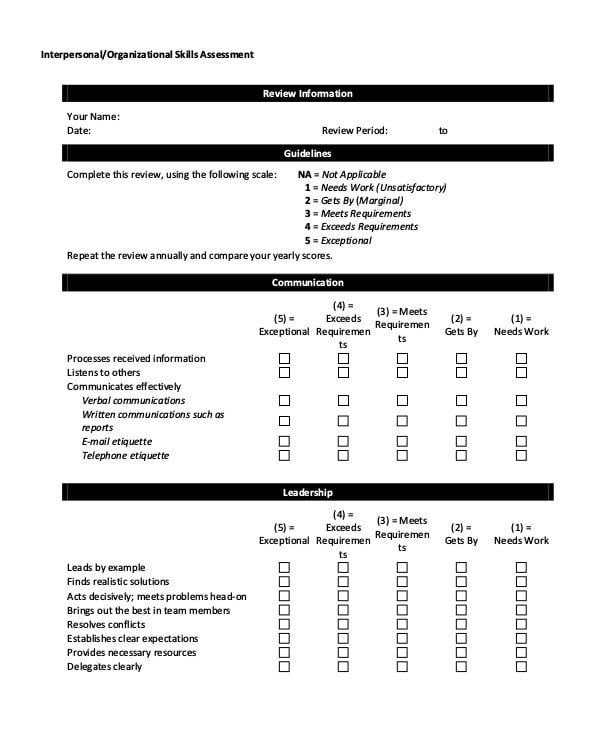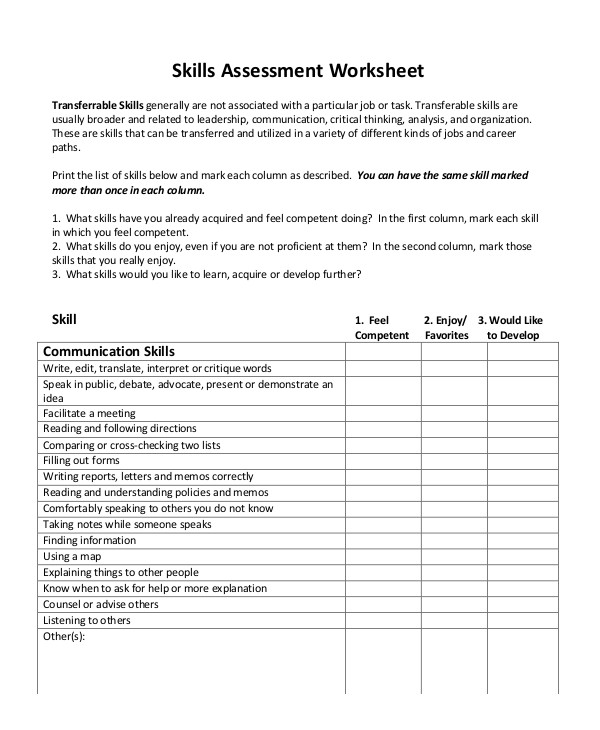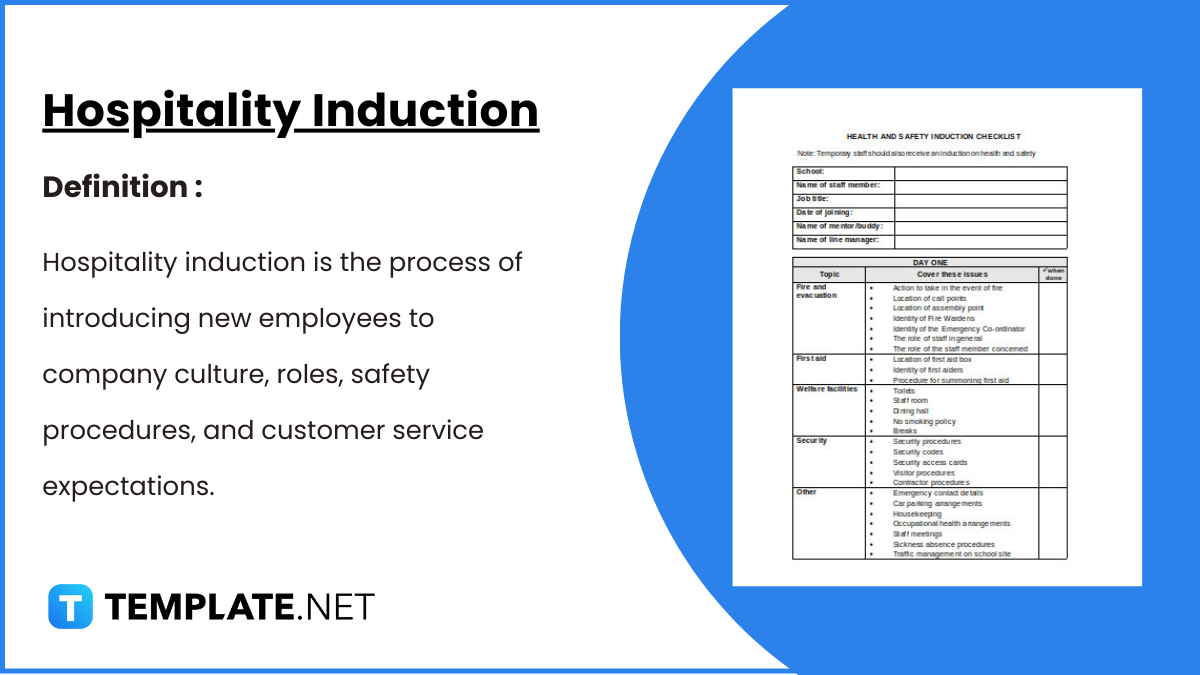
What is a Template?
In today’s fast-paced digital world, efficiency and consistency are key to content creation, and this is where the power of…
Mar 01, 2018
Often in a company, people try their best to be as friendly as they can. They say good morning, greet you with a smile, and try to communicate with you even outside of the workplace and pretty sure you won’t notice that you know more about each other a little bit more. Some might also shine in being the leader of the team. Others would also try to be open to challenges that their supervisors would give them.

Do you want to know why some do that? Don’t take this the wrong way, some act that way so that their supervisors would rate them high in their interpersonal and organizational skills assessment. If the person is already a natural born leader, hard worker, and knows how to work with others well, then he won’t have any trouble with his assessment. An interpersonal and organizational skills assessment is one way to for management to identify if the person is still fit or not to work in the company. In the next few paragraphs, you would not know what an interpersonal and organizational skills assessment form would generally look like and what know its different parts, but also know it’s meaning and how you can improve your interpersonal and organizational skills.

wikimedia.org Download Now

gpmfirst.com Download Now
Before we explain to you the different parts of the form, let us first give you a brief description of interpersonal and organizational skills in the workplace. Having a full understanding of what both terms are would lead you to understand why these two things are interrelated when it comes to the workplace.
1. Interpersonal skill. This skill is most evident with extroverts around the world. They are the naturally outgoing and always have something to talk about. The skill is mostly made up of elements which one is good at like verbal communication, non-verbal communication, listening skills, problem-solving skills and the like. Possessing this skill is not only beneficial if you want to interact with your friends or stranger but also is a big plus in the workplace. Possessing this skill helps one get along with others in the company and be viewed as an approachable person. He is also not afraid to express his opinion and being open to ideas that come along.
2. Organizational skill. This skill can be seen on how a person motivates, influences, and enables other people in the group to contribute to get an achievement done. This is basically how one manages to exert his time, effort, resources, and interpersonal and leadership skills in an impactful way to get the job done as much as possible. The leaders who were born leaders usually are these type of people and usually don’t have a hard time in bringing people together to lead them to success. This type of person knows how to work under pressure and would seemingly find a way to solve a problem and does not give up easily. They can create a culture that adheres and fosters to innovation and collaboration.
Presuming that you already have a clear idea of why these two terms are interrelated and why they are important for every company to have assessments, let us now move on and see what the different parts of an interpersonal and organizational assessment sheet are.
1. Review information and guidelines. This part composes of employees’ name, date, and time that the review took place. As for the guidelines, it instructs the supervisor (or any person in-charge of the employee) to be familiar with the rating per number because this is how he is going to score his employee. Shading or checking 5 would mean his employee is exceptional, 4- exceeds requirements, 3- meets requirements, 2- gets by, and 1-needs work (Unsatisfactory).
2. Communication. This is generally where the supervisors would make their first assessment of their employees. He would rate if his employees’ communication skills are good enough for the weeks or months that have passed by. This is also where he would rate if his employee also has good listening skills and knows how to process the received information.
3. Leadership. This is the part when the supervisor assesses if the employee showed some leadership along the way and how often does he show it. He can identify if his employee is exceptional in this field if he knows how to lead by example, handle conflicts professionally, does not easily give up, finds alternative ways to solve problems, and brings out the best in others. Basically, he can identify if that person is a great and exceptional leader if he also brings out the leader in others too along the way.
4. Relationships. This is where he would identify if his employee works well with others. This does not only apply to his co-workers but also to the customers the company caters. If a supervisor thinks that his employee has been consistent in giving good or even excellent customer service and can be patient enough, that employee will surely be rated exceptional.
5. Project Management. This is where the supervisor assesses how his employee knows what to prioritize first and is keen on organizing certain tasks that are given to him occasionally. He will also rate if the employee is good in giving out a lot of strategies that could make a plan work and would know how to manage a project’s costs effectively.
6. Productivity. This is one of the most important things the supervisor will assess in his employees especially if the company adheres to productivity in the workforce. He has to recall if his employee has been meeting deadlines on time and can complete a task fast without destroying its quality. This is also the part where the supervisor would rate if his employee works smart.
7. Personal Development. This part of the assessment is where the supervisor would rate how much development and growth his employee experienced already. This is where he would recall if his employee has been consistent in setting standards for himself and would always ask to do something challenging and out of his comfort zone. These types of employees usually are the goal-driven kind and most likely would grow to be an exceptional leader.
So when do these kinds of assessment happen in the company? Well, it is generally up to management and HR to decide when to have the assessment depending on the time or if it is in the company policy when certain kinds of assessment would take place.

ccv.edu Download Now
If you are not confident with your interpersonal and organizational skills, then you don’t need to worry because if you will be given tips on how to develop them respectively. It is understandable that not everybody is an extrovert but it is also understandable that people can learn things if they really want to achieve it. Here are the tips:
If one can only be consistent in trying to be a better person in the workplace, then it will also be brought outside of the office. Being good at something does not happen overnight. The one thing that is sure is that if you set your goals straight and improve a little bit more each day, you would not only get a good assessment in your workforce, but also in life.

In today’s fast-paced digital world, efficiency and consistency are key to content creation, and this is where the power of…

Hospitality Induction Templates are structured guides created specifically for the hospitality industry to facilitate the onboarding process for new employees.…

Whether you are a business or an organization, it is important for you to keep track of your business bank…

A Company Description provides meaningful and useful information about itself. The high-level review covers various elements of your small business…

A smartly designed restaurant menu can be a massive leverage to any food business.

Whether you need to keep neat records of received payments, or are looking for a template that helps you look…

The most widely recognized use for a sample letter of planning is the understudy who, after finishing secondary school, wishes…

The term “quotation” can refer to several things. While to some it may refer to a quote, which is proverbial.…

A catering quotation is a document that provides information about the initial price of the package offering of a caterer…